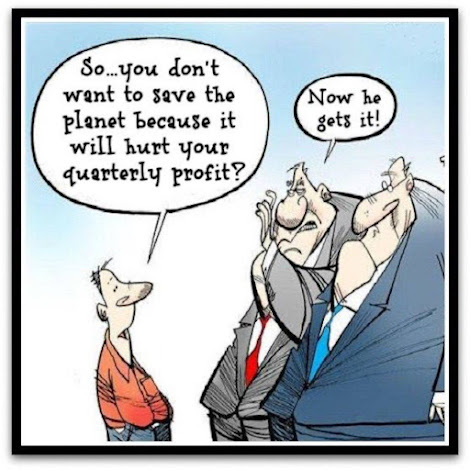That was a headline in Forbes yesterday, followed by: "Scientists Issue New Warning as World Enters 'Uncharted Climate Territory.'"
The Forbes article summarizes an article from BioScience: "The 2023 State of the Climate Report: Entering Uncharted Territory," a follow-up on a 2020 report co-signed by over 15,000 scientists from 163 countries that called on government to make rapid changes:
"We are increasingly being asked to tell the public the truth about the crises we face in simple and direct terms. . . . Record climate anomalies seen around the world in 2023 have astonished the scientific community, raising concerns that further extreme weather, as well as climate tipping points, could arrive sooner than expected . . . pushing our planetary systems into dangerous instability. Such instability, they warn, means that this century as many as six billion of the Earth's almost eight billion people could find themselves in regions that are no longer habitable, due to climate impacts such as extreme heat and dwindling food supplies. . . . The world is now undergoing changes at a speed never before seen in human existence. . . . It is the moral duty of us scientists and our institutions to clearly alert humanity of any potential existential threat and to show leadership in taking action. . . .
Without actions that address the root problems of humanity taking more from the Earth than it can safely give, we're on our way to the potential collapse of natural and socioeconomic systems and a world with unbearable heat and shortages of food and freshwater. . . . The authors call for governments and communities to change their perspective on climate change, 'from being just an isolated environmental issue to a systemic, existential threat.' . . . Simply switching to renewable energy from fossil fuel sources will not be sufficient . . . They call for:
* The implementation of policies that help reduce resource consumption, by reducing, reusing and recycling waste.
* A global, collaborative effort to ensure climate justice, entailing the fair distribution of the costs and benefits of climate action across less wealthy and more vulnerable parts of the world.
* The reorienting of economic measures to prioritize human well-being over growth.
* A stabilization and gradual decrease of the human population by supporting women and girls' education and rights. . . .
This is our moment to make a profound difference for all life on Earth. We must embrace it with unwavering courage and determination to create a legacy of change that will stand the test of time."
More recommendations from the original article not mentioned in Forbes; the omissions are interesting:
* "In 2019, the top 10% of emitters were responsible for 48% of global emissions, whereas the bottom 50% were responsible for just 12%. We therefore need to change our economy to a system that supports meeting basic needs of all people instead of excessive consumption by the wealthy. . . .
* Efforts must be directed toward eliminating emissions from fossil fuels and land-use change and increasing carbon sequestration with nature-based climate solutions. However, it is crucial to explore other possible strategies to efficiently remove additional carbon dioxide. . . . Although research efforts should be accelerated, depending heavily on future large-scale carbon removal strategies at this juncture may create a deceptive perception of security and postpone imperative mitigation actions. . . .
* Coal accounts for . . . roughly 40% of current carbon dioxide emissions. . . . We support the Powering Past Coal Alliance and recommend the adoption of the international Coal Elimination Treaty to phase out coal and, more broadly, the Fossil Fuel Non-Proliferation Treaty . . .
* Climate feedback loops directly affect the relationship between emissions and warming. . . . We call for an Intergovernmental Panel on Climate Change (IPCC) special report that focuses on the perilous climate feedback loops. . . .
* In 2022, an estimated 735 million people faced chronic hunger. . . . There is danger that hunger will escalate in the absence of immediate climate action. . . . Because of the growing risks of concurrent major crop losses in multiple regions of the world, adaptation-focused efforts are needed to improve crop resilience and resistance to heat, drought, and other climate stressors. A shift toward plant-based diets, particularly in wealthy countries, could improve global food security and help mitigate climate change."
The original article is decidedly calling for a shift away from neoliberal capitalism. We have to create equity worldwide, meet the basic needs of all, reduce consumption of resources but also specifically reduce consumerism by the wealthy10% (which, worldwide, includes anyone with a net worth of over $130,000), and reduce meat consumption. If we can't do that immediately, then 75% of the world will have to migrate to the sliver of world still habitable, if anyone allows it, or else perish, within the next 75 years. 75 in 75!!
Seven years ago, I wrote about how childish we were being, ignoring all the indicators that we're headed for collapse like a kid who refuses to take an umbrella when it's clearly about to storm out. Now we're all soaking wet and some will complain that nobody told them to take an umbrella, and others will still insist it's not that rainy out today; they've seen worse. I included this bit from the Newsroom, and it just about sums it up based on our current political climate!


No comments:
Post a Comment